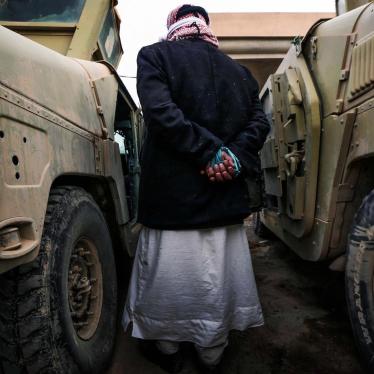(Beirut) – The horrific bombing that killed worshippers at Cairo’s main Coptic Orthodox cathedral compound on December 11, 2016, is the latest attack targeting Egypt’s Coptic Christian community, Human Rights Watch said today. Egyptian authorities should bring to justice those responsible for the violence and take measures to properly protect the Coptic community from such attacks.
The explosion, which killed at least 25 people and wounded at least 49 inside the St. Peter and St. Paul Church, adjacent to St. Mark’s Coptic Orthodox Cathedral, was the deadliest such attack against Coptic Christians since a suicide bomber killed 23 worshippers and wounded 96 at the Two Saints Church in Alexandria in January 2011.
“The egregious attack on the Coptic cathedral should be recognized as an attack on all Egyptians,” said Sarah Leah Whitson, Middle East and North Africa director at Human Rights Watch. “Egypt’s government needs to ensure immediate protection for the Coptic community, especially during the upcoming Christmas holiday. The victims deserve a credible, transparent investigation that brings the perpetrators to justice and is crucial for ending such attacks.”
No group claimed responsibility immediately after the cathedral bombing. President Abdel Fattah al-Sisi issued a statement condemning the attack and offering condolences to the victims’ families. He said that Egyptians were “determined to track down the perpetrators and put to trial everyone involved in this criminal act and other terrorist acts against the country.”
Egypt’s authorities have for many years failed to protect the personal safety or basic rights of Coptic citizens, who make up about 10 percent of the population. At times, the authorities have been directly responsible for attacks: the Egyptian military fatally shot or ran over at least 26 Coptic demonstrators during a protest in central Cairo in October 2011, to express anger over a mob’s destruction of a church in Marinab, a town in Aswan governorate. During the protest, state media outlets reported that Coptic protesters had killed soldiers and called on “honorable citizens” to come out in the army’s defense. Only three soldiers were convicted of manslaughter for killing Coptic demonstrators and sentenced to between two and three years in prison.
The authorities failed to carry out a credible investigation into the 2011 Two Saints Church bombing, first accusing the Army of Islam, a Gaza-based extremist group, of carrying out the attack, then arresting 300 local Muslims, many of them adherents of a strict variety of Islam known as Salafism. One of the detainees, Sayed Bilal, died under torture, and the authorities released the rest for lack of evidence after the 2011 uprising.
The authorities also failed to prevent Muslim rioters from attacking churches in the Cairo neighborhood of Imbaba later in 2011, which left at least 15 people dead and 200 injured. Police arrested around 200 people in connection with the Imbaba attack, and prosecutors referred 48 to the Supreme State Security Court before dropping all charges in 2012.
In April 2013, after clashes erupted outside the Cairo cathedral following an attack by local residents on Coptic funeral mourners, police failed to intervene for hours and stood by as they watched attackers try to break into the compound. Two people died during the violence. Five people, some of them Coptic men, remain on trial for the deadly incident. In August 2013, after al-Sisi forcibly removed then-President Mohamed Morsy from office, police failed to protect churches and Christian property as mobs rampaged through towns in rural areas south of Cairo. Two people died when the mobs set fire to a church-owned Nile River houseboat in Minya.
Authorities have routinely responded to regular episodes of anti-Christian violence in Egypt by enforcing so-called “reconciliation” sessions with their Muslim attackers that deprive Christians of their rights and often result in Christians being forced to leave their homes and towns.
“The government’s recurring practice of neglecting the rights of Egypt’s Coptic Christians needs to end,” Whitson said. “The authorities should start by treating the cathedral bombing with the gravity it demands.”









